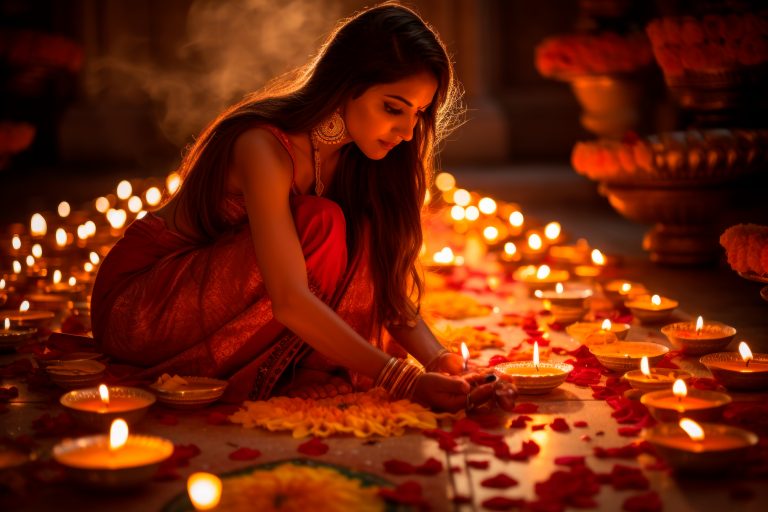India’s cultural tapestry is woven with a myriad of traditions, each holding profound significance and cherished by generations. One of the most iconic and widely celebrated traditions in India is Diwali, the Festival of Lights. This article delves into the specific traditions and customs that make Diwali a cultural phenomenon and a time-honored celebration.

Source: www.freepik.com / Vectonauta
The Festival’s Origin:
Diwali, also known as Deepavali, is a Hindu festival that celebrates the triumph of light over darkness and good over evil. Its roots trace back to ancient Indian scriptures and legends, making it one of the oldest festivals in the country.
The Lighting of Diyas:
At the heart of Diwali are the traditional clay oil lamps called “diyas.” These lamps symbolize the inner light that protects individuals from spiritual darkness. During Diwali, households and public spaces are adorned with countless diyas, creating a mesmerizing and auspicious atmosphere.
Rangoli Art:
Another cherished tradition during Diwali is the creation of rangoli designs. Rangoli is an intricate art form where colorful patterns and motifs are created on the ground, often at the entrance of homes, using materials like colored rice, flower petals, or colored powders. Rangoli is believed to welcome guests and bring good fortune.
Family Gatherings and Feasting:
Diwali is a time for families to come together and celebrate. Special meals and sweets are prepared, and families exchange gifts and blessings. Traditional Indian sweets like “mithai,” “laddoos,” and “jalebi” are a central part of the feasting tradition.
The Goddess Lakshmi:
Diwali also holds religious significance. It is dedicated to the worship of the goddess Lakshmi, the deity of wealth and prosperity. Devotees perform prayers and rituals to seek her blessings for a prosperous year ahead.
Firecrackers and Fireworks:
Fireworks and firecrackers light up the night skies during Diwali, symbolizing the victory of light over darkness and the expulsion of negative energies. While this tradition adds to the festive atmosphere, there is a growing awareness about its environmental impact.
Gift Giving and Charity:
Exchanging gifts during Diwali is a cherished tradition that strengthens bonds between friends and family. Many people also engage in acts of charity and donate to those in need as a way to spread joy and blessings.
Cultural Diversity:
Diwali is celebrated by people of various religious and cultural backgrounds across India. It transcends boundaries and unites people in the spirit of joy and togetherness.
Diwali, the Festival of Lights, is a testament to India’s rich traditions and cultural heritage. Its rituals and customs provide a glimpse into the country’s spiritual and festive ethos. Diwali’s enduring significance lies in its ability to bring people together, foster goodwill, and remind us all of the enduring power of light and goodness in our lives.

